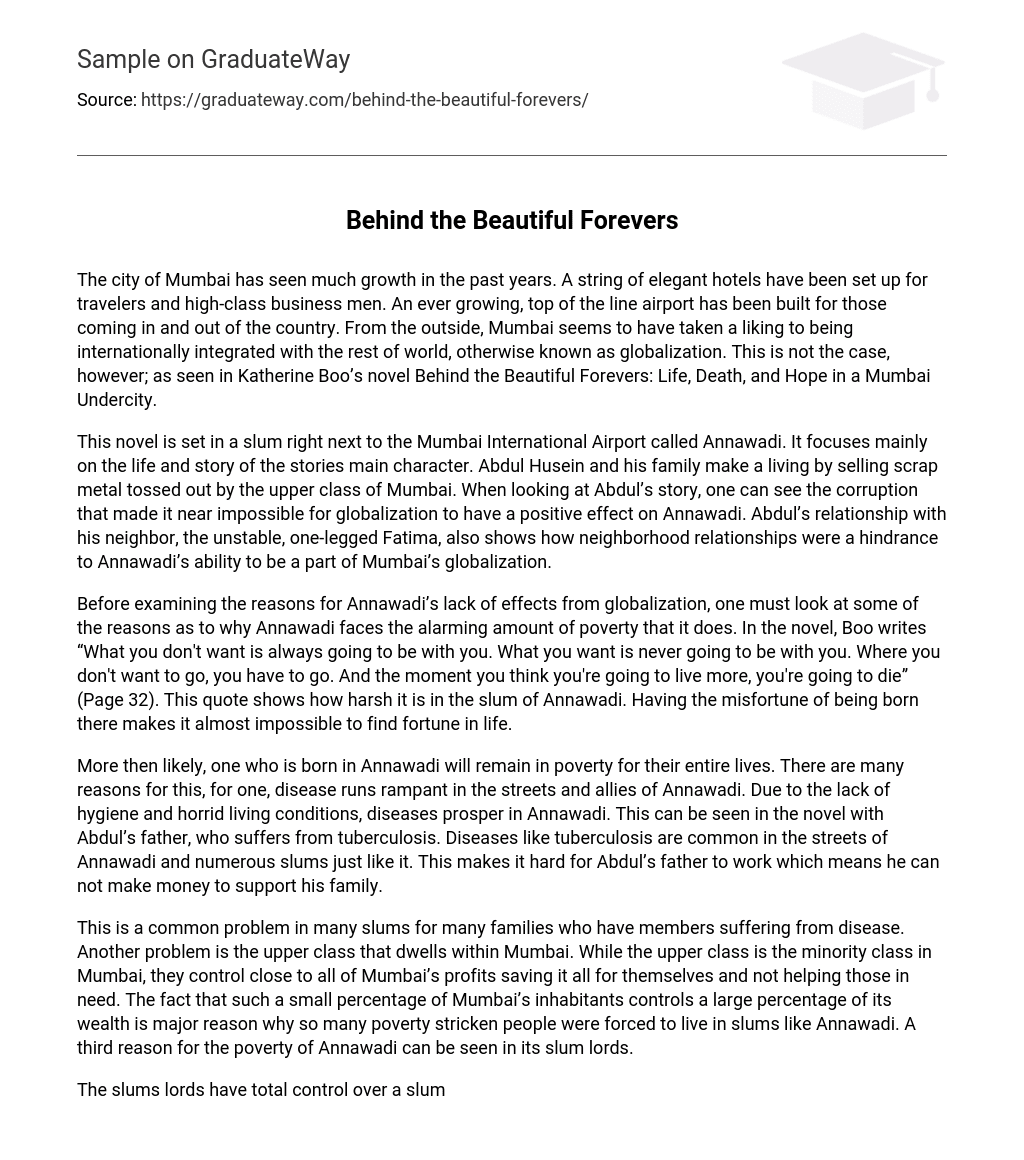Despite the city of Mumbai’s notable progress, with the emergence of opulent hotels and a modern airport serving as an entrance and exit point, its true nature is exposed in Katherine Boo’s novel Behind the Beautiful Forevers: Life, Death, and Hope in a Mumbai Undercity. The book reveals that Mumbai’s apparent embrace of globalization and international integration is far from genuine.
This novel is set in a slum adjacent to Mumbai International Airport, known as Annawadi. It primarily focuses on the life of its main character, Abdul Husein, and his family’s occupation of selling discarded scrap metal from the affluent classes of Mumbai. Abdul’s story reflects the pervasive corruption that hindered any potential positive effects of globalization on Annawadi. Additionally, his relationship with Fatima, an unstable one-legged neighbor, illustrates how neighborhood dynamics inhibited Annawadi’s integration into Mumbai’s globalized society.
The severe poverty in Annawadi is influenced by various factors. Before discussing why globalization has not affected the community, it is crucial to comprehend these contributing factors. In her novel, Boo portrays this grim reality by stating, “What you don’t want is always going to be with you. What you want is never going to be with you. Where you don’t want to go, you have to go. And the moment you think you’re going to live more, you’re going to die” (Page 32). This quote accurately reflects the challenging conditions present in Annawadi’s slums and emphasizes how being born into such circumstances makes attaining prosperity exceptionally difficult.
In Annawadi, it is highly likely that one will remain in poverty throughout their life. There are multiple reasons for this, with disease thriving in the streets and alleys of Annawadi being one of them. As a result of the unsanitary living conditions, diseases flourish in Annawadi. This is evident in the book through the example of Abdul’s father, who suffers from tuberculosis. Tuberculosis and similar diseases are prevalent in the streets of Annawadi and other nearby slums. Consequently, Abdul’s father is unable to work and earn money to provide for his family.
This is a prevalent problem in numerous slums, where families with ill members encounter difficulties. Another issue arises among Mumbai’s affluent population. Despite being the minority, the upper class controls the city’s profits and refrains from aiding those who require assistance. The unequal distribution of wealth among a small portion of Mumbai’s residents significantly contributes to the large number of impoverished individuals living in slums like Annawadi. Furthermore, the presence of slum lords also plays a role in Annawadi’s poverty.
The slum lords exert complete control over a slum and its residents. Encountering a slum lord is tantamount to a death sentence. This fear of their power keeps the population oppressed and hinders any chance of escaping poverty. In her book Behind the Beautiful Forevers, Katherine Boo explains that “A decent life was the train that hadn’t hit you, the slumlord you hadn’t offended, the malaria you hadn’t caught” (Page 45). These factors contribute to the extreme poverty faced by Annawadi. It is clear that these elements have contributed to Annawadi’s exclusion from the benefits of globalization.
In Behind the Beautiful Forevers, Abdul’s story reveals how government corruption resulted in the absence of globalization in Annawadi. Abdul and his family reside in Annawadi where they earn a living by selling scrap metal. Abdul is engrossed in this trade for the majority of his waking hours over many years (page 23). Against all odds, his family manages to purchase a piece of land beyond the slums, offering them hope of escaping Annawadi and its atrocities. Tragically, their dreams remain unfulfilled due to conflicts with their neighbor, Fatima.
Tensions between neighbors in Annawadi prevented globalization from taking hold in the community. The inability of people to work together and get along created a difficult atmosphere for the residents. This was evident in the conflicts between Abdul’s family and their neighbor, Fatima. As Abdul’s family fortified their house, Fatima grew angry and a prolonged fight erupted. Eventually, Fatima reached a breaking point and set herself on fire in an effort to falsely accuse the Huseins. Unfortunately, due to corruption within both the police force and government, Abdul, his sister, and his father were wrongfully convicted for Fatima’s murder.
The lack of globalization in Annawadi can be attributed to corruption, particularly within the police force. This corrupt system enabled the oppression of Annawadi’s residents as individuals with enough money could buy off the police and eliminate anyone who opposed them. This corruption directly contributed to Annawadi’s inability to benefit from the globalization that wealthier parts of Mumbai experienced. In contrast, globalization has had a significant impact on Mumbai, leading to the construction of prominent buildings, airports, and overall prosperity.
The unfortunate reality is that many people do not get to witness the impacts of this prosperity. In Mumbai, numerous individuals are compelled to reside in slums, such as Annawadi, depicted in Katherine Boo’s novel Behind the Beautiful Forevers: Life, Death, and Hope in a Mumbai Undercity. Several factors contribute to Annawadi’s lack of exposure to globalization, evident through the main characters of Boo’s book. Abdul’s tragic account of hope being shattered by his deranged neighbor, Fatima, demonstrates how police corruption hindered those who were unable to bribe their way out, making it exceedingly challenging to escape the horrors of the slum.
The slumlords’ control over the residents of Annawadi hindered globalization’s impact on the community. The oppressive influence of these individuals made it extremely difficult for anyone in the slums to succeed. Boo’s novel provides a firsthand account of the tragic conditions experienced by those living in poverty. While globalization brought prosperity to Mumbai, the presence of these detrimental factors prevented slums like Annawadi from benefiting from that economic growth.
Citation
Boo, Katherine. Behind the Beautiful Forevers. Random House, 2012. Web.





